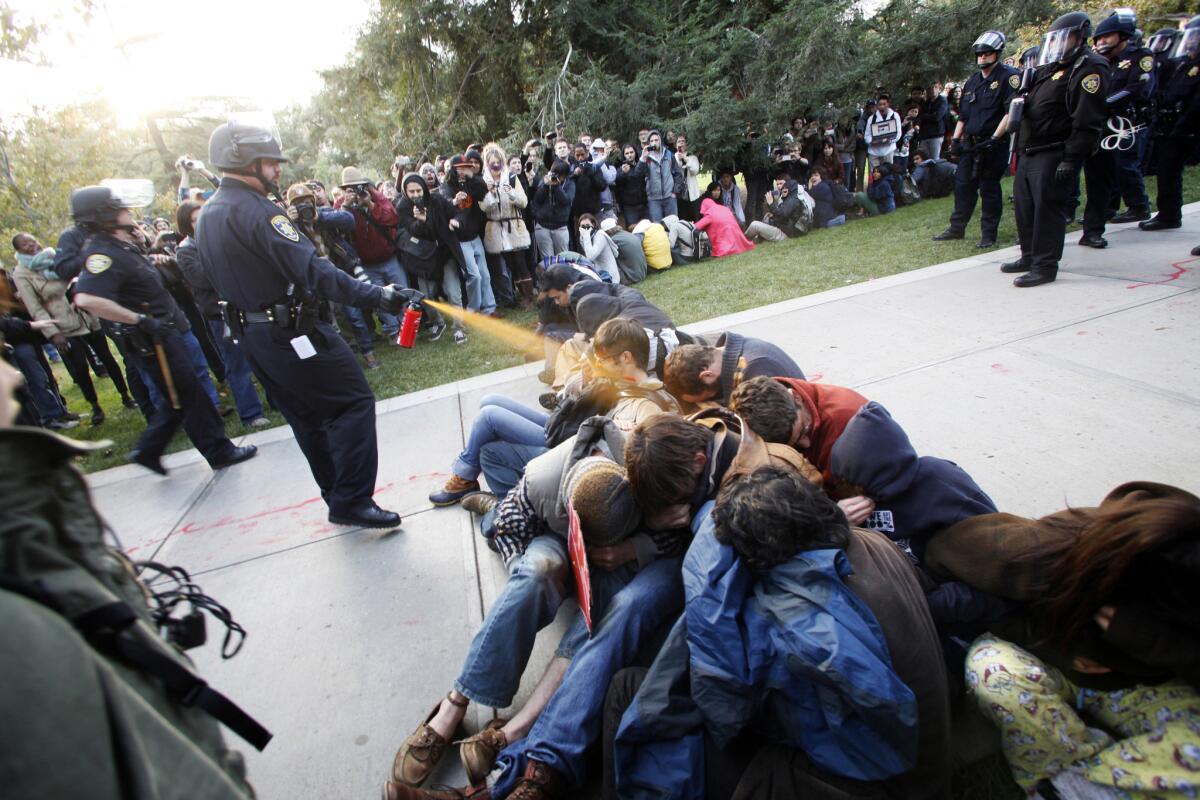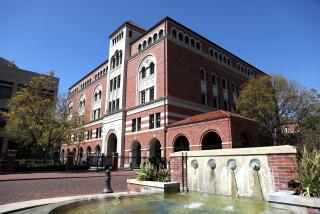Court allows release of officers’ names in UC Davis pepper-spray case

The California Supreme Court has affirmed that newspapers have a right to know and publish the names of all the UC Davis campus police officers involved in the controversial pepper-spraying of student protesters in 2011.
The state high court this week dismissed an effort by a university police union to overturn a lower court ruling in the case last year. A state appellate court in June 2013 held that the California Public Records Act allows newspapers to obtain the names of UC police who planned, participated in or witnessed the pepper spraying. Those identities had been redacted from a UC-commissioned report that criticized how campus police and administrators handled the incident.
The Los Angeles Times and the Sacramento Bee filed the initial lawsuit seeking the officers’ names. Their position was supported by an Alameda County Superior Court and the appeals court but was placed on hold pending Supreme Court action.
In declining to hear the police union’s appeal, the state Supreme Court on Wednesday did not issue a full opinion but referred only to a similar case it decided in May involving the Long Beach Police Department. In that case, the high court ruled that police agencies must reveal the names of officers involved in on-duty shootings unless there is specific evidence that disclosure poses a safety threat.
An international furor erupted after an online video went viral showing UC Davis campus police Lt. John Pike repeatedly spraying the chemical irritant into the faces of seated students. Police at first contended that the spray was the most appropriate tool on hand to deal with what they described as an unruly mob encircling the officers on Nov. 18, 2011.
However, a UC report in April 2012 declared that the pepper-spraying violated policy and that school leaders badly bungled the handling of that campus protest. The investigating task force, chaired by retired state Supreme Court Justice Cruz Reynoso, strongly rebutted campus police claims that the Occupy demonstrators who had pitched tents on a UC Davis quad posed a violent threat.
The names of two police officers long have been publicly revealed: Pike, who was later fired, and campus police chief Annette Spicuzza, who later resigned.
On Thursday evening, the university system released the full, unredacted report of the task force, which identified 18 or so officers who were on the scene or took part in the planning. Most were interviewed for the study.
Besides Pike and Spicuzza, the report and an allied study by Kroll Inc. security consulting firm, focused on four other officers who were said to be at the center of the case.
The reports sharply criticized then-Lt. Barry Swartwood for “abdicating his duties as incident commander” and for failing to lead the operation effectively. Swartwood is no longer a lieutenant but remains on the UC Davis police force as an officer, according to a campus spokesman.
The document also identified the other officer who wielded the pepper spray as Alexander Lee. Lee, who said Pike ordered him to use the chemical, is no longer on the force, according to UC Davis.
Sgt. William Beerman is described as escorting some arrested protesters from the scene without much trouble but the report said there is no evidence that he communicated that to his superiors. If Pike and Swartwood had been aware of Beerman’s success, they might have used different tactics themselves, the Reynoso reports said. Sgt. Ray Sutera, who is now retired from the force, is quoted as saying that at least one protester was attempting to attack another officer.
Earlier Thursday, UC system spokesman Steve Montiel said the university had wanted the names released when the report was issued.
UC agreed to a union request Thursday for a delay of several hours to allow the union time to notify the officers involved, he said.
Thomas Burke, the attorney who represented the newspapers in the UC Davis case, said knowing the names will be “an important closure to the process.” The officers were “not a faceless entity. They carried out that act in the name of the public.”
But Burke, who is with the Davis Wright Tremaine law firm in San Francisco, acknowledged there is “a bitter irony to have these names delayed for so long given that the world reacted to this incident in late 2011.”
Attorneys for and leaders of the Federated University Police Officers Assn. could not be reached for comment.
Follow me on Twitter: @larrygordonlat
More to Read
Start your day right
Sign up for Essential California for news, features and recommendations from the L.A. Times and beyond in your inbox six days a week.
You may occasionally receive promotional content from the Los Angeles Times.







